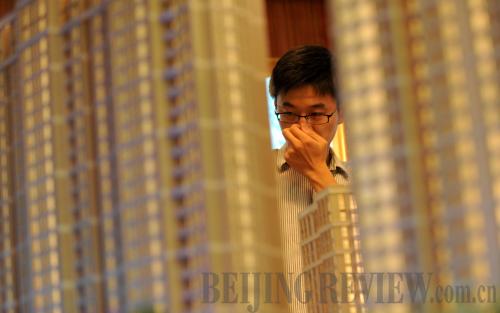|
 |
|
HEAVY PRESSURE: A young man looks at the model of a residential community in Hangzhou, Zhejiang Province; opposite page, a construction site of low-rent houses in Shenmu County, Shaanxi Province (HAN CHUANHAO) |
 |
|
A construction site of low-rent houses in Shenmu County, Shaanxi Province (TAO MING) |
Wan Hengjun is frustrated. After saving diligently for the past 10 years the IT technician still cannot afford to buy an apartment in Beijing, though he and his wife earn more than 20,000 yuan ($2,929) a month, which is a comparatively high salary in the city.
"I really can't understand the housing market. I could have afforded to buy a good apartment of my own five years ago," said Wan. "But now, even with the money I saved in the past five years, I can only afford the size of a kitchen and a toilet in the same building," he said.
In 2005, after working for five years in Beijing, Wan decided to buy an apartment close to his office. Putting down a cash deposit of 150,000 yuan ($21,966.45) along with a bank loan, he had enough for an 80-square-meter apartment.
However, his then decision to save more for a bigger apartment a few years later totally ruined his dream of buying a home of his own. He was shocked to find that his savings grew far slower than the growth of the housing price. In the past five years, Wan's salary increased 20 percent; in contrast the average housing price in Beijing rose from 4,693 yuan ($687.26) per square meter in July 2005 to 25,680 yuan ($3,760.66) per square meter in May 2010, according to data from the National Bureau of Statistics.
Within city limits of Beijing, the average housing price was 35,000 yuan ($5,125.5) per square meter in the first quarter of 2010 and those who bought apartments before 2005 are the envy of all their friends. Those like Wan, who didn't buy back then are pinning their hopes on the government getting involved in the property market and helping prices drop to an affordable level.
Tougher controls
The government has already tried on numerous occasions to control the housing price in the past decade. Ironically, all these attempts failed to have any impact. In fact the opposite happened and housing prices soared to record highs in past five years.
In mid-April, the State Council launched what is considered to be the most severe measures in history. For the first time, the Central Government proposed to make local government officials accountable in the work of stabilizing housing prices and ensuring supply meets demand. Insiders believe that this is an important step as it can sever the link between local governments and property developers. Local governments are widely blamed for supporting the high housing prices as they can profit from the auctions of land use rights to developers.
Besides making government officials accountable, the new measures also tighten bank loans: the deposit required to secure a bank loan for a second home must be a minimum of 50 percent of the total price, and the bank interest is now higher than benchmark interest rate. In some cities with high housing prices, bank loans for a third or more apartments have been suspended.
These measures did have an immediate impact. Statistics from China Index Academy show that during the period April 19-25 after the measures took effect, 21 of the 35 monitored cities witnessed a decrease in property transactions compared with the previous week, with Shenzhen seeing a drop of 64 percent, Beijing, 45 percent, Shanghai, 38 percent and Guangzhou, 2 percent.
"I hope the new measures will lead to a downturn in the crazy housing price in Beijing so that we common salary earners can afford to have our own homes," said Wan.
Forced to rent
Like Wan, many Chinese people view owning an apartment as the most important thing in their life. To them, only when they have their own property in a city where they work do they have a sense of belonging to the city. That also explains why so many people use their entire life's savings or borrow from banks to buy apartments. According to a survey by China Youth Daily in November last year, about 80 percent of the respondents believed that there is a connection between their sense of happiness and owning a home, while 69.9 percent believed that having their own place is a must for a contented family life.
However, because of soaring prices, concepts are changing and people are now being forced to rent. Gao Bo is one of them.
Gao and his wife Zhang Qian both work in a hi-tech park in suburban Beijing. When they got married last year, they had joint bank savings of 200,000 yuan ($29,288.6). Though they could apply for a bank loan to buy a small apartment near their workplace, they chose to rent an apartment.
To buy a home, Gao would have to pay 200,000 yuan deposit, and a monthly mortgage of more than 4,000 yuan ($586) to the bank. "Though our salary could support the mortgage payment, we would have no bank savings. Currently, we still need the money in case of emergencies," said Gao. He thinks that without sufficient savings they would not dare to have a baby.
Now, the couple is paying 1,800 yuan ($263.6) a month renting an apartment. Gao took out some of his savings for stock investment. "I will buy a home of my own when I earn enough money in future, but not now," he said.
Change of attitude
"In some densely populated cities like Beijing, Shanghai and Guangzhou, it is impossible for every family to own an apartment," said Hu Shoujun, Professor of Department of Sociology of Shanghai-based Fudan University, in a phone conversation with ChinAfrica.
Hu said before housing reforms in the late 1990s, most Chinese people lived in apartments allocated by their work units. The state owned these apartments and there was no private ownership. "However, people still felt secure and did not think about who actually owned these apartments," he said.
Hu suggested that people who could not afford to buy an apartment change their attitude on home ownership. "They, especially young people, should first consider renting an apartment before they can afford to buy one. It is not good to buy an apartment through borrowing money or applying for large bank loans; otherwise, they will become slaves to their property and live under heavy pressures brought about by heavy loans," said Hu.
Ren Zhiqiang, Chairman of Huayuan Real Estate Group, is also strongly against young people buying their own properties and putting themselves under great pressure. According to his investigation, in China, the number of people under 30 who have bought apartments of their own accounts for 34 percent of homebuyers; whilst in some developed countries like the United States, the proportion is only 5 percent. "It is abnormal in China," he said in his blog.
Government assisted
Actually, the Chinese Government also devised measures to encourage young people to rent apartments instead of buying. Besides providing government-subsidized apartments to low-income-earners several years ago, China now puts its focus on constructing low-rent housing and public-rent housing for wage earners.
Low-rent houses are subsidized by the government. In some cases, the rent is as low as 1 yuan ($0.15) a month, but the apartments are usually small and the criteria for applying for these houses are very strict.
Unlike low-rent housing, public-rent housing targets wage earners who cannot afford to buy and don't qualify for low-rent housing. The rental is usually 20 percent lower than the market price in this case.
Statistics from Beijing Municipal Commission of Urban Planning show a total of 11 public-rent housing projects are currently under construction in Beijing, which can provide 8,000 apartments. This year, more such projects with combined construction areas of 500,000 square meters will be built with government financial support.
"Besides, the government will also buy some commercial residential buildings as public-rent housing," said Huang Yan, Director of Beijing Municipal Commission of Urban Planning in an interview with China Financial and Economic News. "Public-rent housing will be given top priority in the government-supported housing projects in Beijing," she added. |